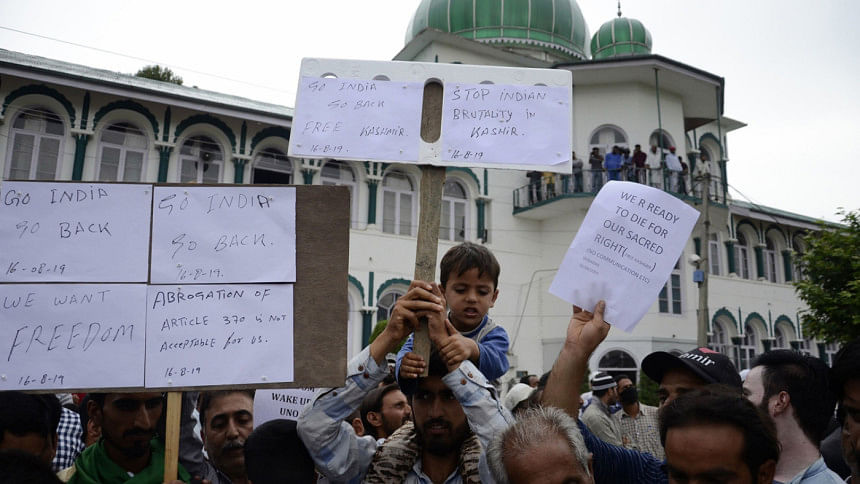Parties should refrain from unilateral action

UN Security Council members believe India and Pakistan should refrain from taking unilateral action over the disputed region of Jammu and Kashmir, China’s UN envoy said yesterday after the council met on the issue for the first time in decades.
The 15-member council met behind closed doors at the request of China and Pakistan after India removed the decades-old autonomy the Muslim-majority territory of Jammu and Kashmir enjoyed under the Indian constitution. China rarely requests Security Council meetings.
Meanwhile, hundreds of protesters in Indian-administered Kashmir clashed with police yesterday, even as New Delhi said it would begin restoring phone lines after a 12-day communications blackout.
While the council did not agree on a statement, China’s UN Ambassador Zhang Jun summed up the discussions, describing serious concern over the situation.
“They are also concerned about the human rights situation there and also it’s the general view of members that parties concerned should refrain from taking any unilateral action that might further aggravate the tension there since the tension is already very tense and very dangerous,” he said.
India’s UN Ambassador Syed Akbaruddin accused Zhang of trying to pass off his remarks as “the will of the international community.” He said India’s decision was an internal matter.
“If there are issues, they will be discussed, they will be addressed by our courts; we don’t need international busybodies to try and tell us how to run our lives. We are a billion-plus people,” Akbaruddin told reporters.
The Himalayan region has long been a flashpoint in ties between India and Pakistan, which both have nuclear arms. UN Secretary-General Antonio Guterres has called on the two countries to refrain from any steps that could affect Jammu and Kashmir’s special status.
The territory has been the spark for two wars and countless clashes between the two nuclear-armed arch-rivals, most recently in February when they conducted tit-for-tat air strikes.
Zhang said “it’s obvious that the constitutional amendment by India has changed the status quo in Kashmir, causing tensions in the region” and called for the issue to be resolved through peaceful means according to the UN Charter, Security Council resolutions and bilateral agreements.
Pakistan’s UN Ambassador Maleeha Lodhi described her country’s push for yesterday’s Security Council meeting as “the first and not the last step.” She said it was the first time in more than 50 years that the council had taken up the issue.
“The fact that this meeting took place is testimony to the fact that this is an internationally recognized dispute,” she told reporters. “The people of Jammu and Kashmir may be locked up ... but their voices were heard today at the United Nations.”
The Security Council adopted several resolutions in 1948 and in the 1950s on the dispute between India and Pakistan over the region, including one which says a plebiscite should be held to determine the future of mostly Muslim Kashmir.
Another resolution also calls upon both sides to “refrain from making any statements and from doing or causing to be done or permitting any acts which might aggravate the situation.”
With the central government in Delhi fearing protests and unrest, the Muslim-majority northern territory has been under lockdown since the first week of August, when the Indian government stripped the region of its autonomy.
Yesterday, police fired tear gas and pellet-firing shotguns to disperse residents who tried to march down the main road in the main city of Srinagar after Friday prayers, reported AFP.
Protesters hurled stones and used shop hoardings and tin sheets as improvised shields, as police shot dozens of rounds into the crowd. No injuries were reported.
“We are trying to breach the siege and march to the city centre but police is using force to stop us,” one protester told AFP, adding that three people were injured in Thursday clashes with police officers and reservists.
Sporadic clashes were also reported in other parts of the Kashmir Valley. Major towns and cities in the restive valley remained under curfew, with government forces allowing people to move only on special passes.
“We want what is ours. We are not begging for anything but demand India should respect its promises,” a second protester told AFP.
“We will not sit back until we achieve complete independence from India,” he said.
The protesters marched along the lanes of Srinagar, carrying black flags -- signifying grief -- and placards with slogans including “Go India, go back”.
The clashes took place as a top official said that authorities would begin restoring phone lines in Kashmir from yesterday evening, including in Srinagar. Jammu and Kashmir chief secretary BVR Subrahmanyam did not make clear whether mobile phones and internet connections would also be reinstated.

 For all latest news, follow The Daily Star's Google News channel.
For all latest news, follow The Daily Star's Google News channel. 



Comments